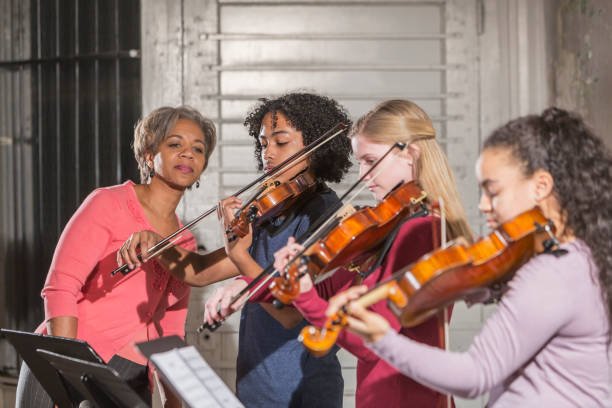Introduction
Classical music is a rich and rewarding field that spans centuries of musical innovation and artistic expression. Whether you’re a novice or have some musical background, this guide will help you learn classical music and appreciate famous classical music pieces. This article covers everything from choosing an instrument to understanding music theory and practice techniques.
What Defines Classical Music?
Classical music is characterized by its structured form, sophisticated harmony, and the use of orchestral instruments. It includes various periods such as the Baroque, Classical, Romantic, and Modern eras, each with distinct styles and contributions to the genre.
The Importance of Classical Music
Classical music has influenced many other music genres and remains a fundamental part of musical education. It helps develop a deep understanding of musical structure, emotion, and creativity.
Famous Classical Music Pieces
Listening to famous classical music pieces can provide inspiration and a deeper appreciation of the genre. Here are some iconic works to get you started:
Top 10 Classical Music Pieces
- Beethoven’s Symphony No. 5
- Mozart’s Eine kleine Nachtmusik
- Bach’s Brandenburg Concertos
- Tchaikovsky’s Swan Lake
- Vivaldi’s The Four Seasons
- Chopin’s Nocturnes
- Debussy’s Clair de Lune
- Handel’s Messiah
- Rachmaninoff’s Piano Concerto No. 2
- Schubert’s Ave Maria
Why These Pieces?
These pieces are celebrated for their melodic beauty, technical complexity, and emotional depth. They represent the pinnacle of classical music and offer valuable lessons for learners.
Classical music enthusiasts, learners, and those seeking melodic beauty, technical intricacy, and emotional profundity will find great admiration for these musical compositions. Exemplifying the apex of classical music, these pieces not only captivate with their artistic brilliance but also serve as an invaluable source of musical education for those eager to learn and discover the wonders of this timeless genre.
Getting Started with Classical Music
Choosing an Instrument
Selecting the right instrument is crucial for your classical music journey. Here are some popular options:
- Piano: Ideal for beginners, it offers a broad range of notes and a strong foundation in music theory.
- Violin: Known for its expressive sound and prominent role in classical compositions.
- Flute: Offers a beautiful tone and relatively simple learning curve.
Finding a Teacher
A qualified teacher can provide personalized guidance and help you progress faster. Look for someone with a solid background in classical music and a teaching style that matches your learning preferences.
Essential Learning Strategies
Practice Regularly
Consistent practice is key to mastering classical music. Set aside dedicated time each day to develop your skills.

Start with Simple Pieces
Begin with simpler compositions to build your confidence and technical skills. Gradually move to more complex works as you improve.
Use Technology
Leverage apps and online tutorials to supplement your learning. These tools offer interactive ways to practice and improve.
Understanding Music Theory
Basic Music Theory
Learning music theory is essential for understanding the structure and elements of classical music. Start with the basics, including scales, chords, and key signatures.
Advanced Concepts
As you progress, delve into advanced topics like harmony, counterpoint, and orchestration. These concepts will deepen your understanding and enhance your musicality.
Why Read Sheet Music?
Reading sheet music allows you to interpret and perform compositions accurately. It is a critical skill for any classical musician.
Basic Notation
Familiarize yourself with basic notation, including notes, rhythms, and dynamics. Practice reading and playing from sheet music regularly.
Improving Your Technique
Finger Exercises
For instruments like the piano and violin, finger exercises are crucial. They improve dexterity and strength, enabling you to play more challenging pieces.
Breath Control
For wind instruments and singing, proper breath control is vital. Practice breathing techniques to enhance your performance and endurance.
Exploring Historical Context
Periods of Classical Music
Classical music spans several periods, each with unique characteristics:
- Baroque (1600-1750): Known for its ornate and complex style.
- Classical (1750-1820): Emphasizes clarity, balance, and form.
- Romantic (1820-1900): Focuses on emotion and expression.
- Modern (1900-present): Explores new and innovative techniques.
- Influential Composers
Learn about key composers from each period. Understanding their lives and works adds depth to your interpretation of their music.
Performance Techniques
Expressiveness
Classical music is known for its emotional depth. Focus on conveying the intended emotion through dynamics, phrasing, and articulation.
Stage Presence
Confidence and poise are crucial for performances. Practice performing in front of an audience to build your stage presence.
Benefits of Ensemble Playing
Playing with others improves your timing, listening skills, and overall musicianship. It also provides valuable performance experience.
Finding an Ensemble
Look for local ensembles or orchestras to join. Many communities have groups that welcome musicians of all levels.
Self-Recording
Recording your practice sessions and performances allows you to hear your progress and identify areas for improvement.
Feedback
Seek feedback from teachers and peers. Constructive criticism is invaluable for your growth as a musician.
Live Performances
Attend live classical music concerts to experience the music in its intended setting. It’s also a source of inspiration and motivation.

Virtual Concerts
With advancements in technology, many concerts are available online. Take advantage of these to expand your exposure to different performers and styles.
Resources for Learning Classical Music
Books and Scores
Invest in quality music books and scores. They provide valuable insights into techniques and interpretations.
Online Platforms
Websites like Coursera, Udemy, and YouTube offer courses and tutorials for learning classical music.
Challenges and How to Overcome Them
- Plateaus: It’s normal to hit plateaus in your learning. Keep practicing and seek new challenges to overcome them.
- Frustration: Learning an instrument can be frustrating at times. Stay patient and persistent.
Staying Motivated
Set realistic goals and celebrate your progress. Joining a community of musicians can also provide support and encouragement.
Conclusion
Learning classical music is a fulfilling endeavor that offers a deep connection to cultural history and personal growth. Whether you are just starting or looking to advance your skills, this guide provides a comprehensive roadmap to mastering classical music. Remember, the journey is just as important as the destination. Keep practicing, stay motivated, and enjoy the beautiful world of classical music.
Frequently Asked Questions
Q. How long does it take to learn classical music?
Ans: The time it takes to learn classical music varies depending on your dedication and practice habits. Generally, it takes several years to become proficient.
Q. Can I learn classical music on my own?
Ans: While it’s possible to learn on your own, having a teacher can significantly enhance your learning experience and provide valuable feedback.
Q. What is the best age to start learning classical music?
Ans: There is no best age to start. Children and adults alike can learn and enjoy classical music.
Q. Do I need to learn to read sheet music?
Ans: Yes, reading sheet music is essential for understanding and performing classical music accurately.
Q. What instruments are best for classical music?
Ans: Piano, violin, and flute are popular choices for classical music, but many other instruments are also suitable.

